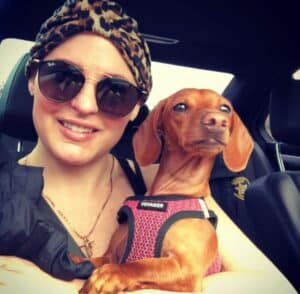
Lindsay was 30 and newly married when she was diagnosed with stage 3 breast cancer in May 2020. From the start, because of the COVID-19 pandemic, she faced doctor appointments and treatment by herself. “I went to every single appointment alone,” she recalled. “My husband would wait outside in the car, so I’d have some sort of support, but it was me and my care team. I didn’t really know any other way, but it was challenging, definitely in the beginning.”
Lindsay’s diagnosis happened within a matter of days—she felt a lump in her breast and called her doctor. A mammogram and an biopsy quickly followed.
“I never in a million years thought I’d get breast cancer. Cancer doesn’t run in my family,” she said. “I have a healthy lifestyle. I work out, eat a healthy diet, don’t drink, so if it could happen to me, it could happen to anyone.”
It took several weeks for the reality of the situation to kick in. “I didn’t identify as somebody who had cancer. I didn’t feel sick. But once I started getting treatment and lost my hair from chemotherapy, that’s when I started to realize, wow, this is real,” Lindsay said.
Her treatment has included chemotherapy, radiation therapy and a double mastectomy with reconstruction. She’s now on hormone medication, which she’ll take for five years. Prior to beginning treatment, she was able to undergo procedures to preserve her fertility.
At the suggestion of her social worker, Lindsay joined a support group made up of women under 35 who have breast cancer. “It’s definitely helped because it gives you perspective on things,” Lindsay said. “Some people going through this have it a lot harder than you, some people have an easier experience. Some people opted to do fertility treatment, some didn’t have the chance. It just shows you that it’s all hard. None of it’s easy.”
Hearing the stories of other people’s experiences with breast cancer has helped Lindsay realize she’s not alone. “It puts everything in perspective,” she said. “I would never want anyone to go through what I have, but it’s made me a stronger, better person in the end.”
Learn more about the unique issues for young women with breast cancer.
Statements and opinions expressed are that of the individual and do not express the views or opinions of Susan G. Komen. This information is being provided for educational purposes only and is not to be construed as medical advice. Persons with breast cancer should consult their healthcare provider with specific questions or concerns about their treatment.



